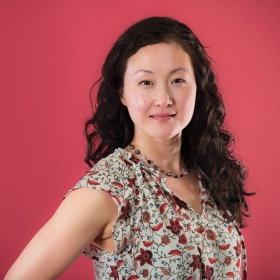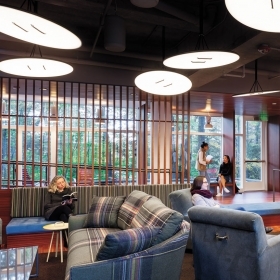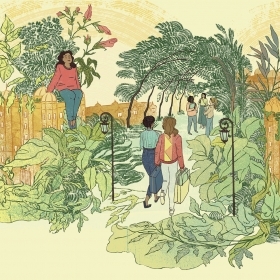Helen Wang
Helen Wang, director of residence life and housing, considers learning to live in community a central aspect of every student’s Wellesley experience. “The residential context is one of the few remaining spaces in the nation where people from all walks of life can be together and intersect,” she says.

A photograph of Helen Wang, director of residence life and housing
Photo by Richard Howard
In spring 2018, Helen Wang, her husband, her young son, and Millie, her English bulldog, left a four-bedroom house in Pennsylvania to squeeze into an apartment in Freeman Hall. Wang was taking up her new role as Wellesley’s director of residence life and housing.
Living on campus, though a temporary solution for her family, proved helpful for Wang’s midyear transition from Carnegie Mellon University to the College. “I asked to do it. It wasn’t part of the job,” she says. Observing how students navigate residential spaces has been critical. “I can see what’s going right and what’s going wrong. It’s also been fun. My 4-year-old and my dog and my husband, we run around the dining halls. People know us. It was really helpful to build trust with the community.”
Wang didn’t set out to work in residence life. She did her undergraduate work in English and psychology at Carnegie Mellon, and went on to earn her M.A. and begin a Ph.D. in American studies there. “I’m ABD in American studies,” she says. While writing her dissertation, she realized, “This is not my voice. This is not the problem or issue that brings me joy.” A mentor at Carnegie Mellon told her about a residence-life position at the university she might try, and, “That’s all she wrote,” Wang says. “The minute I got into that space, I just felt, ‘This is who I’m supposed to be. This is how I’m supposed to give to the world.’ College-age students keep you inspired about the future.”
‘The residential context is one of the few remaining spaces in the nation where people from all walks of life can be together and intersect. … True diversity exists here, and it’s abundant. We have to capitalize on that. It’s a huge miss if we don’t.’
Wang considers learning to live in community a central aspect of every student’s Wellesley experience. “The residential context is one of the few remaining spaces in the nation where people from all walks of life can be together and intersect,” she says. “There is such an opportunity for deep, meaningful relationship development. True diversity exists here, and it’s abundant. We have to capitalize on that. It’s a huge miss if we don’t.”
Concerned that many Wellesley students are socially isolated, Wang and her team of eight staff members have developed a residential life curriculum that focuses on developing a sense of belonging. They seek to foster resilience and well being and teach effective conflict management.
“Wellesley can be a place where people are really serious, and even negative, and we want to make sure that people can be happy here. I’d like to see us translate the energy and ferocity of our students into joy and play,” she says.
Today’s students can find connecting with others difficult, Wang says. “We have to actually teach our students to practice connection.” This can mean pushing against their natural inclinations. “They’ll go to their rooms, by themselves, and watch Netflix rather than go eat a meal with each other,” she says.
Wang and her colleagues in the residential-life profession see this disconnectedness as a national problem. “It’s so much harder to be a young person now,” she says. “Back in the day, when there weren’t devices, when there weren’t opportunities to self-isolate, it was easy. Students would organically find each other. But we can’t assume that making friends is easy for them. They feel it’s intruding if you knock on someone’s door and say hi. We have to help undo that for our students.”
Knocking on a neighbor’s door and asking to borrow a cup of sugar is not in our culture anymore, says Wang—but she believes it should be: “If in a Wellesley residence every student metaphorically can feel comfortable going across a hall, knocking on a door, and getting a cup of sugar, then I will feel I’ve succeeded here.”


